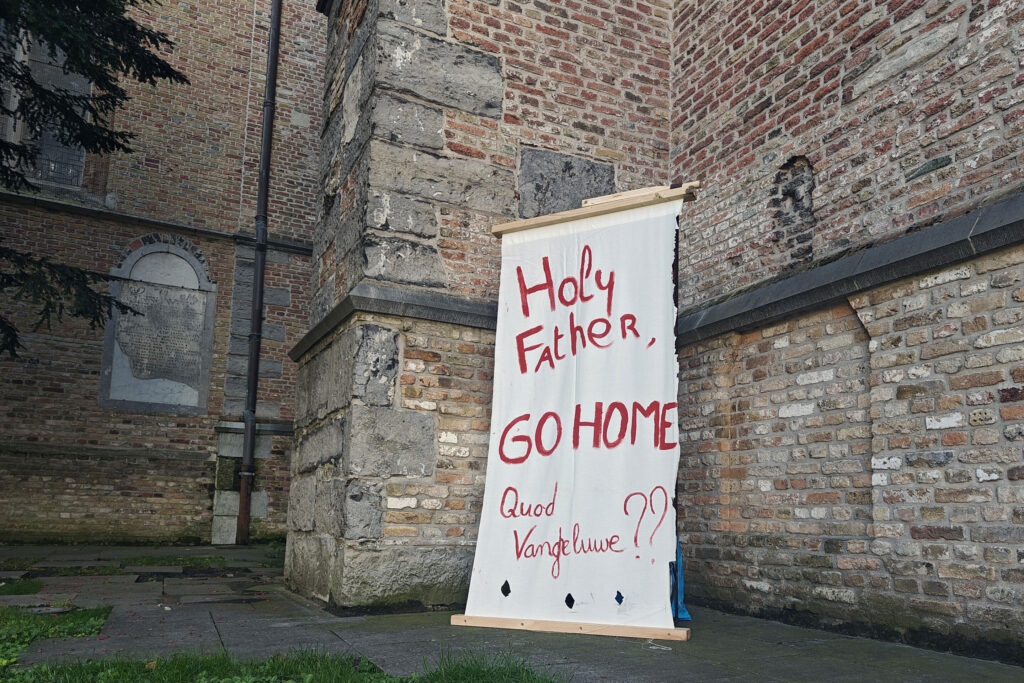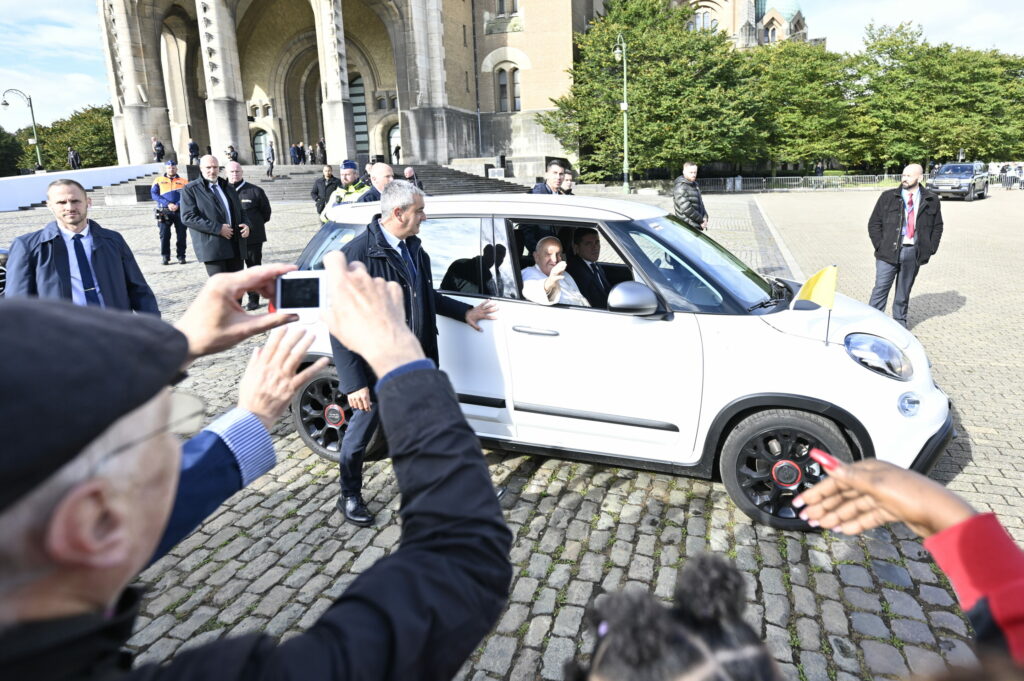Pope Francis' visit to Belgium has been the centre of media attention, with the pontiff's movements the subject of much anticipation. But despite reports earlier this week that the 87-year-old was unwell and might have to cancel some appointments, he has maintained a busy schedule and even surprised followers with unscheduled meetings.
On Saturday morning the Pope made a visit to the Church of Saint Gilles, where he met with a local association that provides support to homeless people. The stop was not part of the official itinerary but the Pope spent half an hour meeting people before going to Koekelberg Basilica for a conference at 10:00.
Entering the Basilica through the 9-metre high door reserved for special occasions, the head of the Catholic Church was welcomed by 3,250 attendees including bishops, priests, deacons, and pastoral workers. Six of these individuals addressed Pope Francis: a priest, a pastoral agent, a theologian, a religious figure, a prison chaplain, and an advocate against sexual abuse within the Church.
Abuse has been a central topic of the Pope's visit. The pontiff has become skilled in apologising for misdemeanours by the Church – a PR effort that forms part of many of his visits. On Friday, Pope Francis met with 15 Belgian victims of sexual abuse at the Vatican Embassy in Brussels. In a meeting that lasted two hours rather than just one, he referred to the crimes as "our shame", likening the misdeeds to the slaughter of children by King Herod.
Pope Francis has received strong public comments on the Vatican's handling of the child sexual abuse scandal during his visit to Belgium.
The Belgian King and Prime Minister de Croo both made statements criticizing the handling of the issue. pic.twitter.com/u9qWwMM60l — DW Europe (@dw_europe) September 27, 2024
Both King Philippe of Belgium and outgoing Prime Minister Alexander De Croo condemned sexual violence committed against minors by clergy in Belgium. "You are committed to justice, but there is still a long way to go. Words alone do not suffice, we need concrete steps," De Croo said. In response, the Pope said that "The Church must beg forgiveness".
Exactly a year since the damning Flemish documentary "Godvergeten" revealed the shocking extent of sexual abuse in the Belgian Church, public opinion on Catholicism has been largely critical. In the Koekelberg Basilica, Mia De Schamphelaere – a former member of the Flemish and federal Parliament – expressed the horror, sadness, and helplessness felt by many.
Pope Francis thanked the organisations that have been created to provide support for victims, saying they "transform anger and pain into help, closeness, and compassion." He recognised that abuse "undermines the path of faith".
Fallen from grace
Although Pope Francis showed humility and contrition on behalf of the Church, the institution seems irreparably tarnished and diminished within Belgian society. Speaking on Saturday, the Bishop of Burges reflected that the monumental basilica symbolises a not-so-distant past when the Church held substantial influence. "But times have changed," the Bishop concluded.
Indeed, the undiminished anger that many have for the Church has also been on display this weekend. Some took the opportunity to carry out protests in the media attention.
Civil organisations were indignant when it was reported that the pontiff called Belgium's abortion laws "murderous" during his visit to King Baudouin's tomb on Saturday. Visiting the grave of the late monarch (king from 1951 to his death in 1993), the Pope spoke of Baudouin's "courage" in not signing "a murderous law".
In 1990, King Baudouin (who was devoutly Catholic) refused to sign the bill that decriminalized abortion. His refusal to do so was unprecedented and required the Federal Government to declare Baudouin temporarily unable to reign.
The Centre for Secular Action strongly condemned this "provocation" on what happens to also be International Safe Abortion Day. Belgium's abortion laws continue to be a topic of considerable debate. The Centre highlighted that access to safe and dignified medical procedures is a fundamental right for all women and that opposing it endangers women's health.
The Centre also asked how Belgium can tolerate such interference from the head of a theocratic state.

Activist Bart Deschacht highlights abuse in the church with a protest at Bruges Cathedral on Saturday 28 September 2024. Credit: Belga
Pope Francis then visited UCLouvain in Louvain-la-Neuve on Saturday afternoon as part of the university's 600th anniversary celebrations.

